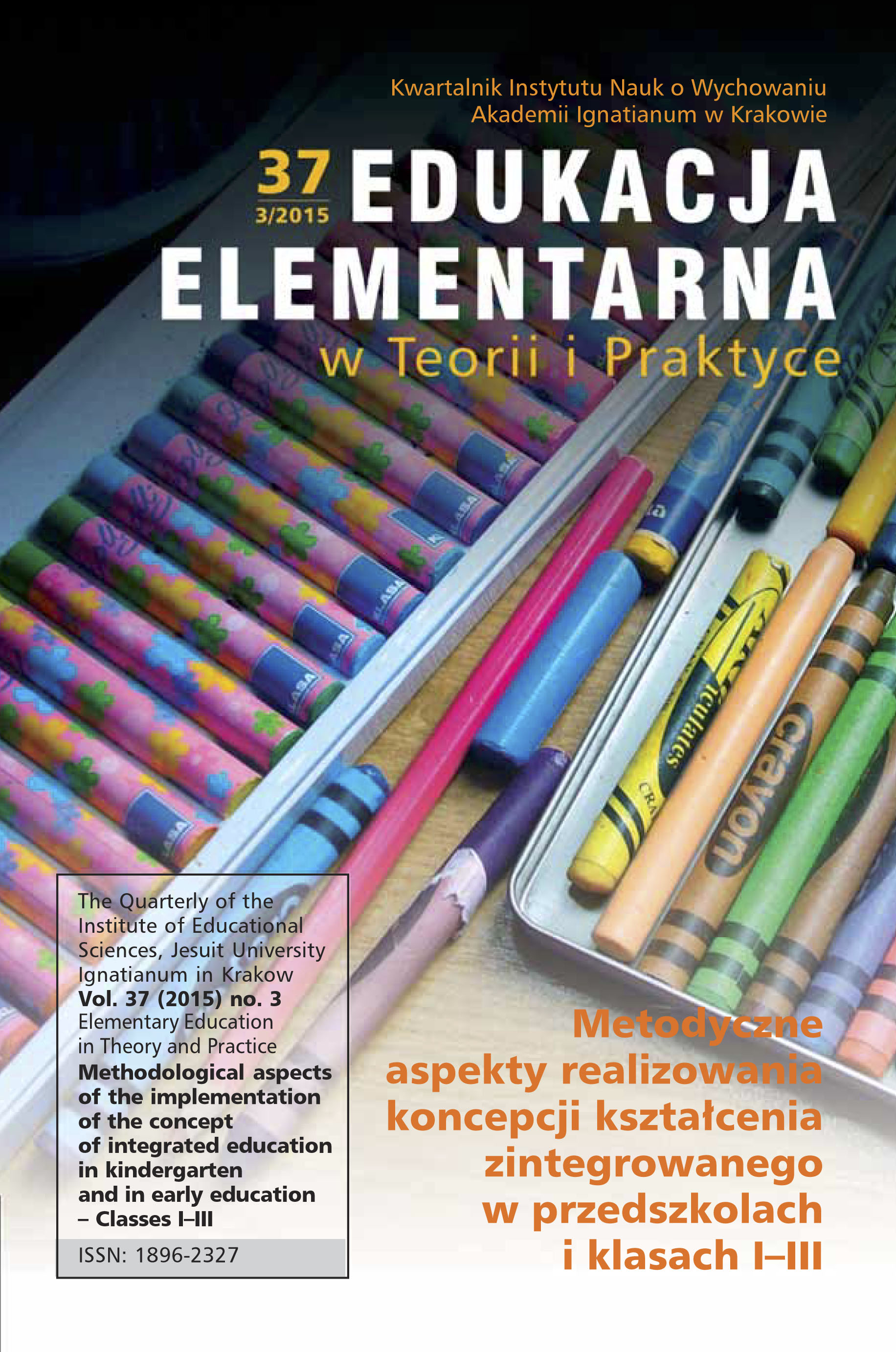Zajęcia techniczne w edukacji wczesnoszkolnej
Abstrakt
Artykuł porusza kwestie edukacji technicznej prowadzonej w szkołach podstawowych w klasach I–III. Rozwój nauki i techniki wpływa na całokształt życia ludzi oraz odpowiada za poziom kultury współczesnej cywilizacji. Ludzie są niejako zmuszeni do codziennego „stykania” się z wytworami techniki oraz do swobodnego z nich korzystania. Można zatem wnioskować, że człowiek w nieustającym procesie kształcenia nie może pominąć znaczącego rozwoju kultury technicznej. Zajęcia techniczne w edukacji wczesnoszkolnej mają wprowadzać w teraźniejszość techniczną. Pierwsze lata nauki szkolnej stanowią czas, kiedy to dziecko napotyka na szereg nowych wyzwań, z jakimi dotychczas nie miało styczności. Artykuł uwzględnia informacje dotyczące zastosowania przez nauczycieli na zajęciach technicznych z dziećmi odpowiednich metod i form pracy, uatrakcyjniania treści kształcenia. Autor poszukuje sposobów motywujących uczniów do działań twórczych oraz rozwijających dziecięce zdolności i zainteresowania. Edukacja w klasach I–III szkoły podstawowej jest realizowana w formie kształcenia zintegrowanego. Ogromną rolę odgrywają w niej nauczyciele – kreatywni, twórczy i innowacyjni, którzy poza prowadzeniem zajęć z edukacji polonistycznej, matematycznej, muzycznej, przyrodniczej pokazują dziecku „świat techniki” i rozwijają jego pasje, talenty i zainteresowania. Świat, z którym na co dzień styka się każde dziecko, obfituje w różnorodność przedmiotów stworzonych przez człowieka. Wiele z nich, mających służyć zabawie oraz edukacji, zawiera innowacyjne, techniczne wynalazki. Uczniowie na zajęciach technicznych uczą się projektować, planować i wytwarzać przedmioty użyteczne. Kształcą wrażliwość, odkrywają jednocześnie swój potencjał i talent oraz zapoznają się z elementami organizacji pracy.Bibliografia
Atutow P.R., Zasada politechnizacji w nauczaniu, WSiP, Warszawa 1981.
Drejer F., Wychowanie do techniki dzieci w młodszym wieku szkolnym, Wydawnictwo Kolegium Karkonoskiego, Jelenia Góra 2010.
Furmanek W., Nauczanie techniki w klasach początkowych, Wydawnictwo Wyższej Szkoły Pedagogicznej, Rzeszów 1992.
Furmanek W., Podstawy wychowania technicznego, Wydawnictwo Wyższej Szkoły Pedagogicznej, Rzeszów 1987.
Gałązka E., Mastalerz E., Ewaluacja osiągnięć uczniów z techniki informatyki, Wydawnictwo Naukowe Akademii Pedagogicznej, Kraków 2002.
Janicka-Panek T., Program nauczania dla I etapu edukacji wczesnoszkolnej, Wydawnictwo Nowa Era, Warszawa 2012.
Kozielecki J., Koncepcja transgresyjna człowieka, [w:] Kształcenie wczesnoszkolne na przełomie tysiącleci, (red.) W. Puślecki, Oficyna Wydawnicza „Impuls”, Warszawa 2000.
Kraszewski K., Edukacja ogólnotechniczna w nauczaniu początkowym, [w:] Nauczyciel i uczeń w nauczaniu zintegrowanym, (red.) I. Adamek, Wydawnictwo Naukowe AP, Kraków 2002.
Kupisiewicz C., Dydaktyka ogólna, Wydawnictwo „Graf-Punkt”, Warszawa 2000.
Lewowicki T., Światowe tendencje a stan i perspektywy edukacji wczesnoszkolnej w Polsce, [w:] Kształcenie wczesnoszkolne na przełomie tysiącleci, (red.) W. Puślecki, Oficyna Wydawnicza „Impuls”, Warszawa 2000.
Marszałek A., Elektronika w edukacji technicznej dzieci i młodzieży, Wydawnictwo Wyższej Szkoły Pedagogicznej, Rzeszów 2001.
Parafiniuk-Soińska J., Kształtowanie umiejętności autokreacyjnych uczniów, [w:] Kształcenie wczesnoszkolne na przełomie tysiącleci, (red.) W. Puślecki, Oficyna Wydawnicza „Impuls”, Warszawa 2000.
Puślecki W. (red.), Kształcenie wczesnoszkolne na przełomie tysiącleci, Oficyna Wydawnicza „Impuls”, Warszawa 2000.
Silberman M., Uczymy się uczyć, Gdańskie Wydawnictwo Psychologiczne, Gdańsk 2005.
Więckowski R., Współczesna koncepcja integracji edukacji wczesnoszkolnej, [w:] Kształcenie wczesnoszkolne na przełomie tysiącleci, (red.) W. Puślecki, Oficyna Wydawnicza „Impuls”, Warszawa 2000.
http://rozek.republika.pl/dokumenty/moje/metody_aktywizujace_ na_lekcjach_techniki.pdf (dostęp: 24.05. 2015).
Copyright (c) 2016 Edukacja Elementarna w Teorii i Praktyce

Utwór dostępny jest na licencji Creative Commons Uznanie autorstwa – Bez utworów zależnych 4.0 Międzynarodowe.
1. Autor zgłaszając swój artykuł oświadcza, że jest Autorem artykułu (zwanego dalej Utworem) i:
- przysługują mu wyłączne i nieograniczone prawa autorskie do Utworu,
- jest uprawniony/a do rozporządzania prawami autorskimi do Utworu.
Oświadcza, że nie narusza praw autorskich osób trzecich i praw prawnych.
Oświadcza, że nie występuje żaden konflikt interesów.
2. Udziela Uniwersytetowi Ignatianum w Krakowie nieodpłatnej, niewyłącznej, nieograniczonej terytorialnie licencji do korzystania z Utworu na następujących polach eksploatacji:
- utrwalania utworu w formie papierowej, a także na nośniku cyfrowym lub magnetycznym;
- zwielokrotnienia utworu dowolną techniką, bez ograniczenia ilości wydań i liczby egzemplarzy;
- rozpowszechniania utworu i jego zwielokrotnionych egzemplarzy na jakimkolwiek nośniku, w tym wprowadzenia do obrotu, sprzedaży, użyczenia, najmu;
- wprowadzenia utworu do pamięci komputera;
- rozpowszechniania utworu w sieciach informatycznych, w tym w sieci Internet;
- publicznego wykonania, wystawienia, wyświetlenia, odtworzenia oraz nadawania i reemitowania, a także publicznego udostępniania utworu w taki sposób, aby każdy mógł mieć do niego dostęp w miejscu i czasie przez siebie wybranym;
- w zakresie praw zależnych do Utworu, obejmujących w szczególności prawo do dokonania koniecznych zmian w Utworze, wynikających z opracowania redakcyjnego i metodycznego, a także do dokonania tłumaczenia Utworu na języki obce.
Udzielenie licencji następuje z chwilą przekazania Utworu na rzecz Uniwersytetowi Ignatianum w Krakowie. Uniwersytet Ignatianum w Krakowie jest uprawniony do udzielania dalszych sublicencji do Utworu, w zakresie udzielonego prawa. Licencja jest ograniczona czasowo i zostaje udzielona na okres 15 lat, licząc od daty jej udzielenia.
Wyraża się zgodę i zachęca autorów do publikacji ich tekstu w Internecie (np. w repozytorium instytucji lub na jej stronie internetowej) przed lub podczas procesu składania tekstu jako, że może to prowadzić do korzystnych wymian oraz wcześniejszego i większego cytowania opublikowanego tekstu (Patrz The Effect of Open Access). Zalecamy wykorzystanie dowolnego portalu stowarzyszeń badawczych z niżej wymienionych:




